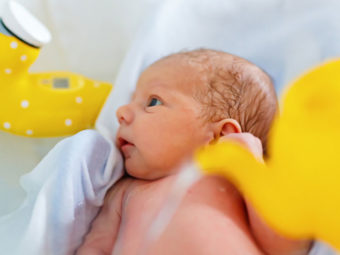
Image: Shutterstock
Newborn babies are delicate and precious, and parents love to spend time with them. Yet, when it comes to communicating, most parents are at a loss for words, quite literally. This is because there is a huge misconception that babies can only communicate through crying, that too only hunger and sleep. And that they do not feel pain as much as adults since their pain sensors are underdeveloped, just like everything else. However, all this is now found to be untrue according to a scientific research (1). According to this study, babies do feel pain and can also communicate their feelings to their caregivers. Here are 6 important points to know about a newborn’s pain and feelings:
1. Newborns Can And Do Communicate
Babies do cry and communicate hunger and sleep. But they also communicate through non-verbal means to express themselves.
- If your baby rubs his/her eyes and yawns – he/she is ready to sleep.
- Putting his/her hand in the mouth, opening the mouth or licking lips – he/she is probably hungry.
- Yelling, fussing or crying every time you try to put your baby down – he/she is feeling lonely and needs you around.
- Looking sleepy or lethargic during an illness or after a medical procedure – indicates pain and discomfort, needs your comforting.
2. Newborns Do Feel Pain
Newborns often come across as sleepy and lethargic during or after a medical procedure, barring the bout of crying caused by a needle prick, either to anesthetize or draw blood. This leads to the assumption that they’ve hardly felt pain or have tolerated the procedure well. But the fact is, as mentioned earlier, these are signs that your newborn is in constant pain and discomfort, which makes them feeble.
3. Newborns Are More Sensitive To Pain
According to a study published in 2015, babies not only feel pain like adults, they are also extremely sensitive to it (2). Researchers studied the MRI scans of babies’ brains when they were poked with an object, similar to the poke of a pencil. These scans were then compared with that of the adults who had undergone a similar ‘poke’ procedure. They found that there were 18 brain regions that were active in babies while experiencing the pain compared to 20 active brain regions of adults for the same. Considering how delicate babies are, this only means they are probably more sensitive to pain than we are.
4. Babies Need Help To Cope With Pain
Whether it’s circumcision, blood tests, or other neonatal procedures, newborns are often subjected to needle pricks. While oral painkillers are prescribed in time to alleviate the pain, you can pitch in too. Try to breastfeed your baby every time you notice him/her in discomfort. Swaddle, cuddle, and talk to your baby. All these gestures will definitely create a ‘feel-good’ mood for your baby and he/she will feel secure with you. This will also help build trust between you and your baby. There is also a new research published by the American Academy of Pediatrics regarding guidelines to be followed for newborn pain relief (3), which should prove quite helpful.
5. Babies Require Emotional Health And Security
Having spent nine months in a safe and secure environment, it’s a big leap for babies to enter the huge, intimidating world which makes no sense to them. They feel vulnerable and look for security. Therefore, try to answer every cry of your baby as much as you can, even if you’ve just attended to all of his/her needs. Your baby needs to know you are there for him/her whenever he/she wants you. Your touch and interactions help develop your baby’s emotional health and security.
6. Babies Do Feel Lonely And Bored
如果你的宝宝哭每次你放下他/她or does not seem very interactive, chances are either he/she is feeling lonely or bored. Try to hug and comfort your baby when he/she cries. Swaddling also makes babies feel warm and secure. Get an amusing toy to entertain or take plenty of scheduled outdoor walks and talk to him/her while you are walking to help stimulate your baby out of his/her boredom.
Now that you know your baby’s emotional and pain quotient, we hope you start approaching his/her needs with a new perspective. Your realization and timely response to your baby’s needs during pain and emotional lows will help develop your baby’s trust in you and will make him/her a more secure person in future.














